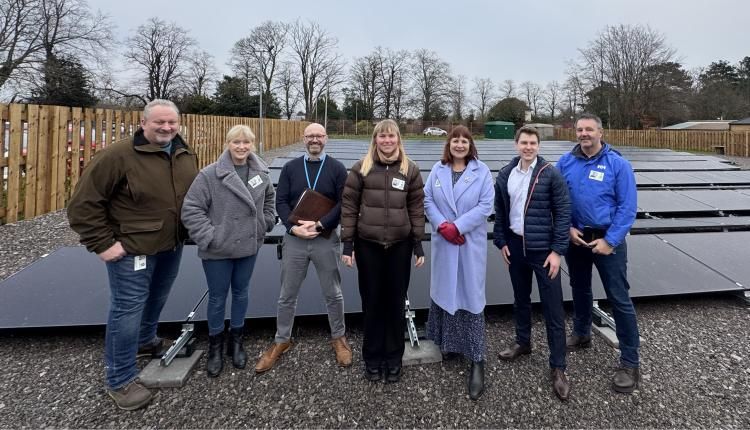Giant green ambitions for Bedfordshire school
We take a closer look at newly installed heat pumps which are beginning to make a difference to children’s learning
An enterprising Bedfordshire primary school with its very own animal farm has successfully navigated a Public Sector Decarbonisation Scheme project.
Kings Oak Primary School, Bedford, played host to our Salix team to celebrate the completion of the net zero project which has involved installing five air source heat pumps across its site.
The £846k Public Sector Decarbonisation Scheme grant also helped pay for other energy efficiency measures including cavity wall insulation, LED lighting and solar PV.
The energy saving project has been funded under Phase 3b of the Public Sector Decarbonisation Scheme with Bedford Borough Council contributing £4.48m. This contribution meant the works could also include new windows as well as radiator installations.
Collectively, these measures are projected to save 627,329 kWh and reduce carbon emissions by 114 tonnes of CO2e annually, achieving a 58% overall reduction in carbon footprint.
The expected savings translate to a £47k annual return on investment.
During the visit our team discovered how the three air source heat pumps housed next to the Harrowden buildings as well as the two pumps used to heat Stephenson buildings, were making a difference.

From left: Principal mechanical and electrical systems engineer Ken Huck and Manager for major capital projects Joanne Branson-Budd, both of Bedford Borough Council, Headteacher of Kings Oak Primary School Rob Morley-Smith, allocations team member Joanna Sandels of Salix, Cllr Jane Walker of Bedford Borough Council, senior programme manager Liam Gillard of Salix, both of Salix and project manager and senior building surveyor at Bedford Borough Council Stephen Fletcher.
Photo credit: Salix Finance
Headteacher Rob Morley-Smith explained how the new technologies meant that room temperatures were now much more comfortable thanks to the new systems, additional insulation and updated windows and doors.
He says staff and children have commented that they are much happier with the improvements to the learning environment.
He said: “It is very important to us here at King Oak that we are environmentally conscious and involve the children in the work we are doing to reduce our carbon footprint.
“The project has enabled us to rethink how we involve children in our sustainability work and it’s fantastic that they can now see on site examples of how we are achieving this with the heat pumps and solar array.
“We are adapting our curriculum now the project is finished to include focused learning around the new equipment.”
It is very important to us here at King Oak that we are environmentally conscious and involve the children in the work we are doing to reduce our carbon footprint.
During the visit they were also able to discuss the electrical upgrades and solar array. The solar project was switched from being roof mounted to becoming ground mounted during the project works to overcome structural limitations.
Project Manager Stephen Fletcher, who is a senior building surveyor, met the team to explain the work.
He said: “The project required extensive enabling works and improvements to enhance the buildings heat loss calculations to support the large mechanical and electrical provisions, including the air source heat pumps and solar array.
“These improvements encompassed roofing upgrades, cavity wall insulation, and replacing single-glazed windows with double glazing.
“Working in an operational environment presented unique challenges, particularly in meeting planning and statutory requirements.
“Despite these hurdles, the team delivered an outstanding project that aligns with the council's ambitious carbon-neutral targets for 2030.
“These enhancements will significantly benefit the school by providing a more energy-efficient and comfortable learning environment, reducing energy costs, and setting an example of environmental responsibility for students and the community alike.”
The primary school, which has a register of more than 870 children, is home to a range of impressive facilities including science laboratories, art rooms and cleverly designed outside spaces.
The school farm is a huge highlight and is home to chickens, goats, pigs, rabbits, ducks and other animals.
Back to school for team member
The visit was particularly important for our senior programme manager Liam Gillard – who attended the lower school more than 25 years ago.
Liam said: “It so impressive to see what has been achieved at this huge school site.
“There have been challenges not least keeping the lessons going and ensuring the children continue to learn.
“It felt very positive to go back to where I went to lower school and see the success of a holistic project that has combined building fabric works with heat pumps to decarbonise school.
“They have managed to create an inspiring project and overcome challenges during project delivery.
“Not only has it given the schoolchildren a better environment, but it will contribute to the council's commitment to become carbon neutral by 2030 and can be used as an example for future project pipeline development.”




